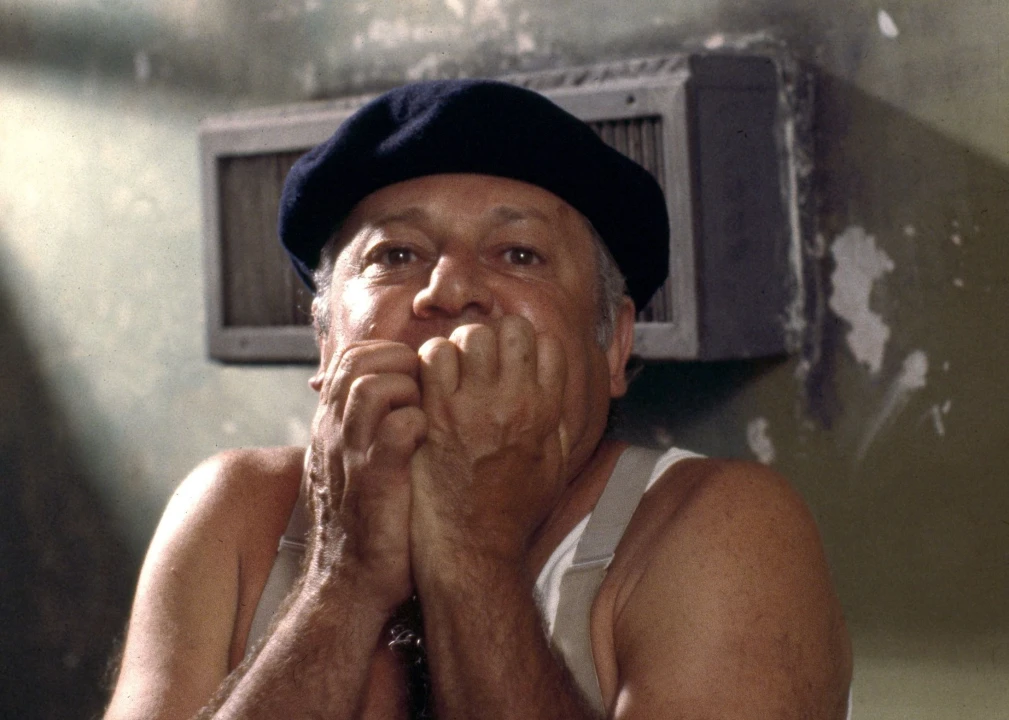Today we celebrate a wonderful 40 years anniversary: in fact, it was October 1975 when the Italian cinemas saw for the first time a movie that would soon have become an absolute cult: "Fantozzi", directed by Luciano Salce and starring the comedian Paolo Villaggio, creator of the character which, before landing on the big screen, had been used in television shows and for a series of books. Fantozzi is an absolutely average employee (namely, an accountant), victim of continuing abuse, injustice and cowardice, targeted by the deepest misfortune, not only in the workplace but also in everyday life, as shown by his not exactly handsome wife and daughter.
His anonymity and the complete disregard that the world and fortune have against him are symbolized, for example, by the fact that his name is constantly crippled and forgotten (Fantozzi become Fantocci, Fantossi, even Pupazzi ...). The accountant protagonist of what will soon become a thriving film saga (from 1975 to 1999 there will be 10 movies with the main character, even if more and more repetitive and less fun) is, perhaps, the most important and best known symbol of the loser and inept produced by the Italian cinema. Fantozzi also is one of the best Italian representations of the modern man, not only victim of injustice, but also of conformism and, above all, partly complicit in this injustice, which he considers as inevitable means to achieve his work goals and his desires of everyday life (for example, the consideration of the higher duty or a date with whom he considers the most desirable colleague in his office, the legendary Miss Silvani.
So, Fantozzi is represented as a mediocre man forced to be mean, but at the same time capable of small outbursts of humanity, but never of a real rebellion: a symbol, as a victim and as an accomplice, of servility.
The weapon used to describe the character and his world is an emphasized grotesque, based primarily on a "slapstick" physical comedy (by itself instrument of the aversion of the world, as the tradition of that kind of comedy since Buster Keaton days) accompanied by the creation of a particular language, which soon became cult, too. A conformist and ungrammatical Italian, made of wrong conjunctive verbs and symbol, in the mid 70's, of a linguistic uniformity not yet fully accomplished.
The grotesque, accentuated by the fact that these movies have not an exact plot, but they are more a series of funny sketches, finds inspiration in two different models. The first is that of modern literature focused on the difficulties and the confusion of the individual in a mass society: Villaggio was in fact inspired by the paradoxes of the irony of Kafka and Gogol, whose story "The coat" has a character who is a kind of Fantozzi before the original one. On the other hand, the film by Luciano Salce is the representation up to the extreme of an important thread of the Italian cinema: the so-called "Italian comedy", born in the years of the Italian economic boom, characterized by a critical and bitter glance, in many cases almost dramatic, about the distortions, imbalances and the illusions of that period, representing in particular individuals like Fantozzi, unable to play by the rules, or to achieve even common objectives.
The Italian comedy increased its dark, dramatic and grotesque tones over the next decade, the one of the 70's economic crisis: Fantozzi, directed not by chance by a director who has been a symbol of this kind of cinema, is one of the most famous and successful examples of this trend. Watching Fantozzi, in fact, we constantly laugh, and there are countless comic sketches and idioms known by almost every Italian; but it often is kins of a sad laugh, one that leaves a deeper sense of anxiety and distress. A comedy that exceeds the boundaries of irony and social custom. All this can be seen in the first two chapters, Fantozzi and The Second Tragic Fantozzi, directed by Luciano Salce in 1975 and 1976, and less and less in the other sequels, where the comedy becomes more repetitive and superficial.




